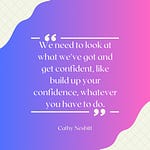About
Christos Panagiotidis, once a dedicated car mechanic, daringly embraced a thrilling career shift to cloud engineering. Merging mechanical ingenuity with tech-savvy intuition, he forged an inspiring path, challenging norms and defying expectations. Christos' electrifying journey illuminates the power of pursuing uncharted dreams and discovering untapped potential.
Christos Panagiotidis: https://www.linkedin.com/in/christospanagiotidis/
Nobody Wants To Work Tho Website - https://www.nobody.chat
Subscribe To The Newsletter - https://www.switchintotech.com
Listen On:
Apple Podcast - https://nobody.fyi/apple
Spotify - https://nobody.fyi/spotify
Google Podcast - https://nobody.fyi/google
Donate:
Stripe - https://nobody.fyi/donate
Cashapp - $mselyserobinson
Patreon - https://nobody.fyi/patreon
Be A Guest: https://nobody.fyi/guest
Affiliates:
Switch Into Tech - https://www.switchintotech.org
Nube: Switch Into A Cloud Career Book - https://nobody.fyi/book
Tech Freebies - https://nobody.fyi/freebies
Monthly Seminars - https://nobody.fyi/seminars
Full Tuition Scholarships - https://fullscholarships.org
Data.gal - https://www.data.gal
Alternate Titles For The Algorithm:
Wrenches to Web Services: A Car Mechanic's Journey to Cloud Mastery
Revving Up the Cloud: How a Car Mechanic Reinvented His Career as a Cloud Engineer
Clouds and Carburetors: One Mechanic's Exciting Career Shift
Engine Overhaul: Trading Pistons for Cloud Platforms in a Bold Career Leap
Mechanic on a Mission: Turbocharging the Tech World as a Cloud Engineer
From the Garage to the Data Center: A Car Mechanic's Cloud Engineering Adventure
Shifting Gears: The High-Octane Journey from Auto Mechanic to Cloud Expert
Digital Torque: A Car Mechanic's Unlikely Rise to Cloud Engineering Stardom
Refueled: The Chronicles of a Car Mechanic Turned Cloud Computing Prodigy
Show Notes
[00:00:00]
Speaker 1: Hey, you all. This is your host, Elyse Robinson with Nobody Wants to Work No podcast. I hope these stories will inspire you to switch careers. I was an auditor in my past life and now I'm in tech, and let's get to it. We are.
[00:00:20]
Speaker 2: Switch.
[00:00:20]
Speaker 1: Into Tech. Tech resources to accelerate your.
[00:00:24]
Speaker 2: Career.
[00:00:25]
Speaker 1: In information technology. Monthly classes on tech topics. We offer free or discounted exam vouches, scholarships, free Udemy courses, free events, free boot camps, and more.
[00:00:37]
Speaker 2: You can find us.
[00:00:38]
Speaker 1: At.
[00:00:40]
Speaker 2: Www.switching to tech. Org.
[00:00:45]
Speaker 1: Hey, you all. This is Elyse Robinson with the Nobody Wants to Work Though podcast. Today we have Chris. He is in Germany, originally from Greece, so I'm excited to have him. He's our second international guest. You can go ahead and tell us about your first career and then what are you doing now. Chris.
[00:01:05]
Speaker 2: Hello, I'm Chris. I'm originally from Germany and right now I'm working as a cloud engineer and I started my career working as a car mechanic. I'm working in the IT field almost 11 years right now. Thanks for having me.
[00:01:25]
Speaker 1: Eleven years. All right. Here's a fun one. What did you want to be when you became a grownup?
[00:01:38]
Speaker 2: I didn't have something specific on my mind, but when I started to see what possibilities you have with using the internet, because internet back then was a new thing, I started to get very interesting on a personal level and afterwards on business level, and that's why I try to get the IT direction.
[00:02:07]
Speaker 1: Got you. Let's see, what was the catalyst that made you go from being a car mechanic to a cloud engineer? What made you interested in it? I know cloud hasn't even been around for 15 years, so how did you find out about it? Etc.
[00:02:32]
Speaker 2: When I started my education as a car mechanic, I did my education in Greece, and the possibilities you have was limited. I thought, Okay, my father was a mechanic, so maybe I like it. But it wasn't really my thing. I was always at least practically one of the worst in class. I was hating it. And parallel, I started to work or use a computer, use the Internet, and I fall in love with that. My motivation was that I want to do this on a business level. That was the biggest point to change my career from a car mechanic to work to the IT.
[00:03:39]
Speaker 1: Got you. You just woke up one day and was like, Let me play around the computer, see what it can do for me, and start doing a little bit of research and dug a little bit deeper and enjoyed it. It's funny that you say that your father was a car mechanic. My parents worked for the government, so I didn't want to work for the government. I tried to get in the private industry. It didn't work out. I was like, Okay, well, I saw what the government did for my parents. We lived a good life and things like that. That's what I went and did. My first career, I was an auditor. It always cracks me up when people say, I didn't want to do what my parents did, and a lot of people still end up doing it.
[00:04:31]
Speaker 2: I see.
[00:04:34]
Speaker 1: All these things come at a cost. What did it cost you along the way? Did you have support from your father? Because I'm pretty sure you got lip telling you, Hey, why are you giving up being a car mechanic? What did your friends say? What did they say?
[00:04:54]
Speaker 2: It was neutral. The thing was that sometimes in my case of my father, you do something, for example, digitally, and it's not like you do something physically. And sometimes in your environment, if you don't do something physically and you just do it digitally, even if it's something difficult, they just don't see that. So the biggest cost, I would say, was I had to start from the beginning with no education whatsoever. I was self paced in a sense. But the important thing was I had a passion for it. I think that's the most important thing you have to have if you want to be very good in one thing. And the mind was neutral. It wasn't negative about it, but it wasn't positive either. So it was neutral, I would say.
[00:06:01]
Speaker 1: Got you. That's good that you had support. I will say when I left my good government job, my father was like, I'm insane. But my catalyst was my mother passing away. I quit my job pretty much my whole life in order to help out my family and take care of her. My second one where I didn't have any support, somewhat, was when I moved to Mexico and my father thought I was insane. I'm like, Daddy, I'm not coming back. He was like, Okay, well, just be safe. That's one of the reasons why I asked that question because support goes a long way when you're trying to make these decisions in life. What was your process on switching careers? Did you take any special courses? Did you talk to people about what their path was? Did you go into any meetups, seminars? What did you do?
[00:07:07]
Speaker 2: The thing was, it was like end of the 90s, beginning of the 2000s. Regarding digital education, it was limited. The first thing I did was in the beginning, I went to different internet cafes. There I started to get in love with the whole technology part. I started at the first thing I did was to buy a computer by myself, try what I can do with it. In some point after I was finished with my car mechanic education, I I did went to high school, to night high school with the technology direction. After work, I did education in the technology field. That was the winning point, I would say.
[00:08:07]
Speaker 1: Got you. How did you convince people to take a chance on you from being a car mechanic to being in the cloud tech and things like that? Because one thing, at least in the States, is it's very hard to make the career switch. You know what I'm saying? It's like, okay, you have all this experience before, and it's not like it wouldn't lend to those experiences to be able to do that job. But a lot of times people want you to already have the experience, which doesn't make sense. I know for a fact, at least in Europe, they have these apprenticeships and internships and things like that, which isn't really a thing in the state, which is ridiculous. How did you convince people to say, Hey, I want to take a chance on him and give him the keys to this stuff? Because we're talking about potentially million dollars of stuff that you could damage.
[00:09:12]
Speaker 2: Yeah, I see. The road to start with the cloud was a long one. When I finished with my education back in Greece, I tried to, as a car mechanic, after some years, I did, as I mentioned, the education in the IT. I went to Germany. This is 11 years ago because the whole infrastructure in Greece was difficult. I had already some experience with Germany. I knew the culture. I was speaking native German because I was born here and raised until one age here. In the beginning, when I went back to Germany, I was working in different industries over agencies. It was tough because it doesn't have to do anything with the IT. We had to what I did, if you work over an agency where they lease you on different companies, the bad thing is you get less money than you would have if you were a permanent employee on a company. But the good thing is you can get easier in different position even if you don't have experience. That's what I did. I was working in different companies over this leasing company and I was sending my CV parallel to other leasing agencies to start my career in the IT.
[00:10:54]
Speaker 2: That's how I went in the IT field. My first job was to It was like a roll out. I went to the customer side, took their piece... Took their hardware, changed their hardware, and that was it. It wasn't a big deal, but it was for me a kick starter to work in the IT.
[00:11:17]
Speaker 1: Got you. You worked with temp agencies that took a chance on you and placed you different places?
[00:11:26]
Speaker 2: Yes. I was a little bit confused in the beginning because I had maybe 15 companies in seven months. Before I started with the whole IT stuff, sometimes I just went for one, two days in a company, did some generic stuff, and the next week I was in another company. It was a little bit confusing for me. But it was a start just to get working here in Germany because you have to start somewhere.
[00:11:59]
Speaker 1: Got you. Okay. Yeah, that's a good way to get some experience. I don't know if that's a thing in the States. I haven't heard of it before. I know there are tent agencies in the States, and yeah, that's a possibility that you could jump around. But usually contracts are like 6 to 12 months and things like that. Even then, they want trained personnel with experience. Yeah, that's one reason why I like Europe because they have these programs where you can get on the job training and get paid for it and stuff like that. Because yeah, in the States, they'll say there's a shortage, but they don't want to take a chance on anyone. So it's like they only want senior people. But yeah, I find that to be really interesting how you got your experience. Let's see, what are some positives and negatives of your new career? You touched on being a car mechanic, it's very physically demanding. Also, one thing is as a car mechanic, you can literally see your work. When you're in this digital world, no one can necessarily see your work. I find that to be a barrier in tech too, because certain positions feel subsets or whatever you want to call it, you're not able to show your work.
[00:13:37]
Speaker 1: They say build a portfolio and all this other stuff, and it's like, but I can't show my work. What are some of the positives and negatives of your new career?
[00:13:51]
Speaker 2: Yeah. I would say the most positive thing was I could do something I had a passion on it. I didn't just want to have a regular basis job to just get my bills on. I want to do something I had a really passion on, and most importantly, I have fun with it. So I would say that was the biggest pro on my IT career. Another positive point was it's a very demanding... No, it's a very... If you are specializing in one thing to find a new job, I wouldn't say easy, but you have a lot of possibilities, maybe in comparison on other jobs, I would say. Especially in the cloud field, you have to be very dynamic and you have to update and educate yourself because it's a very updating platform. I would say if you do that, you're almost regarding your knowledge on the top in the IT field. Regarding the negative, I would say, depending on what you are doing, you can have some maybe a little bit different personalities and different experience and maybe sometimes the environment, some bad experiences. In my case, I had to start literally from zero regarding my IT career because I was working on a totally different field before of that.
[00:15:48]
Speaker 2: The start was rough, but I think if you have a goal and you repeat yourself and stick with it and don't give up, you will be successful. That's my mindset.
[00:16:10]
Speaker 1: Got you. Me being in the tech world, it's very hard to keep a breast of a lot of things. It's a constant learning. I have a fight with myself all the time. My podcast about myself is called Business Brain versus Tech Brain. My business side, accounting audits pretty much been the same probably since the beginning of time. 1 plus 1 is always going to be two. Compliance, comparing two things and see if they add up. That's never going to change. And figuring out what the root cause of something is. And tech, that is me sitting behind the computer focused for hours at the end of the day and not wanting to talk to people, constantly learning. And it's a constant fight. So yeah, I get you on that. What are some traits that you believe would make someone successful in the cloud world?
[00:17:26]
Speaker 2: What are some traits? I have to first example, for me, I have a very strong IT support background. And for me to went from IT support jumping over the classic sys admin position and went directly to the cloud engineering. I would say the biggest trade off was to sometimes convince maybe people that cloud is the future. I had some situation where people were stuck with the classic SIS admin mentality and they didn't want to do anything with the cloud. I would say that probably sometime was a little bit of a trade off because I couldn't convince people to start to get involved in the cloud and they just wanted to do what they were doing for years. That's probably the biggest trade off, I would say.
[00:18:36]
Speaker 1: Got you. I find some traits to be... You have to be a constant learner. I tell people all the time, if you want to be in tech and you don't want to sit down and learn all the time. If you don't love learning, then this isn't for you. That's true. It changes at the drop of a dime, the speed of light. This isn't on there. I need to add it to my question list. But do you think that being a car mechanic first helped you in this career, being in tech cloud specifically? And do you think that you wasted time? Do you think you should have went into cloud first or do you think that you should have been a car mechanic first?
[00:19:29]
Speaker 2: I don't think I wasted time because every education, everything you learn in life is important and it will benefit you somewhere sooner or later. Cloud thing wasn't the thing back then. I went to the Cloud, I don't know, four years, three years ago. But if I had the opportunity back then to go directly in the IT, I probably have done that. But because the system on the education system in Greece was limited, I had like five jobs to choose and IT wasn't on the list. I said, Okay, let's try car mechanic because I thought, Yeah, my father did that so maybe I can give it a try and see if I like it or not. But I think that it doesn't matter what you do. You have to see everything as a step stone on your further goal. And I think you have to be a lifelong learner. You have to be a You are right on that, especially in the IT. If you're not willing to learn or educate yourself with whatever way you're going to do that, it's probably not the right direction you have to go. I think you can do different jobs where you do more or less the same stuff every day for years, and that's it.
[00:21:06]
Speaker 2: But in the IT, you have to be a lifelong learner.
[00:21:13]
Speaker 1: Definitely. I asked that question because I've asked the question to myself. Like I told you, I've always loved tech. I taught myself when I was nine or 10 years old. One summer, my parents thought something was wrong with me sitting in the house in my room. It served me well, but I couldn't find an internship, and so I switched to accounting. Now that I'm older and in there, it's like, should I have stayed at it and kept at it and pursued it? I had to come to terms with, no, that wasn't your life path. Being an audit, you loved it. It served you well. You have different skills that you can apply to pretty much anywhere. And it forced me to be an adult also, I will say that, because I dealt with CEOs all the way down to the secretary, so a diverse range of people. It made me do presentations and get up in front of an audience of people that all eyes are on me. And yeah, I wouldn't be doing this podcast right now if I hadn't been in the audit because I'm an introvert naturally. I see it as a challenge when I do these things because the stereotype of introverts is you just want to sit in the corner and code.
[00:22:53]
Speaker 1: That's why I asked that question. One of the reasons why I started the podcast is so people can see that it's okay to have varied interests and do different things. It's okay to think about your past and say, Hey, what if I had did this earlier or whatever? Everyone that I have asked this to didn't have any regrets. They always say that their previous career blended well to their current one. That's why I asked that question. Last question, what would you tell someone that wanted to change their career, switch their career? What advice can you offer them?
[00:23:48]
Speaker 2: I would say to try to find a passion, try different things. There are a lot of possibilities. And if you find something, you really have a passion on it, go for it. If you try to make a switch, you can calculate every pro and cons, but at least try to get a little bit. Maybe you have a tryout or whatever and see if you like it or not before you switch completed the job. So I would say do you just go for it. I think it doesn't help somebody out if he's working on a job he doesn't like for his whole life. And because I think if you like what you do, your mentality is completely different. And you bring this mentality from your business life to your personal life as well. I would say go for it. Just have a little bit. Just do it in a smart way.
[00:25:04]
Speaker 1: Definitely. Where can we find you, Chris?
[00:25:11]
Speaker 2: You can find me on LinkedIn. You can find me on Zink. That's a German podcast... Sorry, German social business platform. I have a home page as well.
[00:25:28]
Speaker 1: Got it. got you. Thank you so much for coming on the show, Chris. I wish you the best in your career. I was excited to have you because you're an expat immigrant like me. I'm always excited to meet other people around the world that have done the things that I have done. Thank you for listening. To those that are listening or watching out there, please subscribe for more. This is this is number 16, I think. Oh, gosh, I'm losing my numbers. You're either 16 or 17 at this point. Stay tuned because we have more coming up. Nobody wants to work, though. you..












